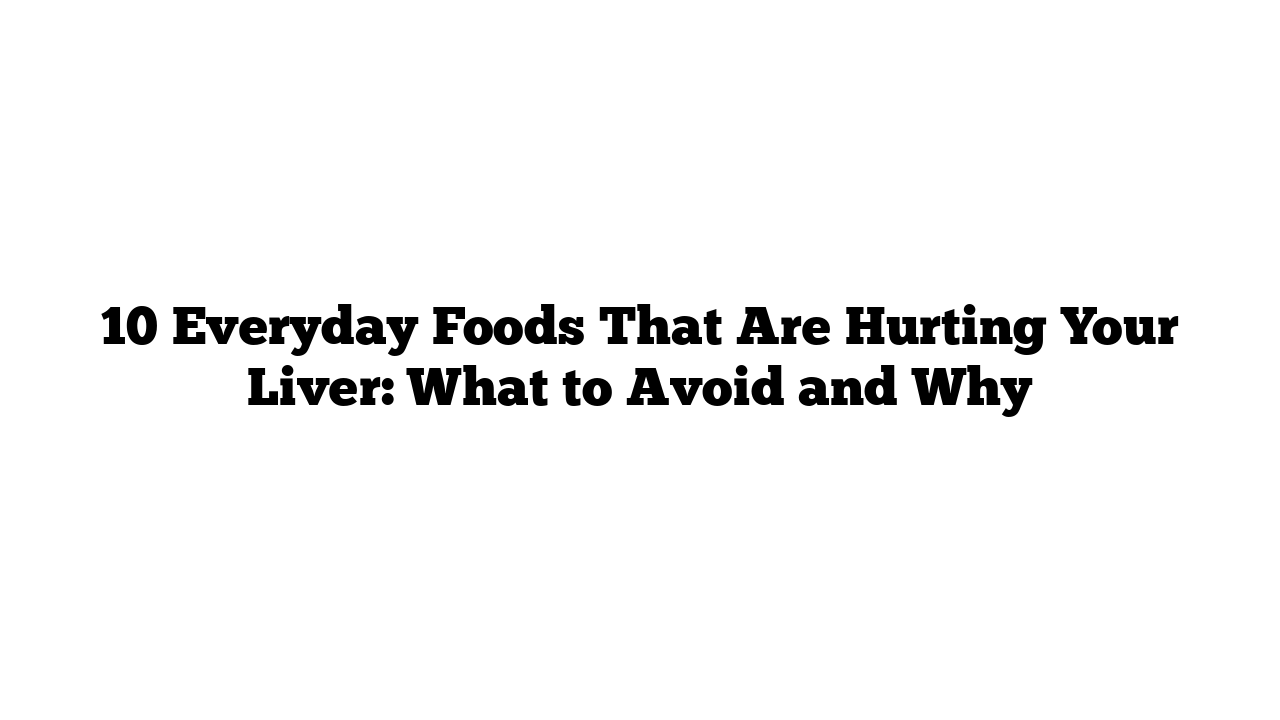The liver is one of our body’s most essential organs, handling everything from processing nutrients and removing toxins to supporting metabolism. Located on the right side of the abdominal cavity, the liver works tirelessly as a “filter” for what enters the body, breaking down nutrients and eliminating waste. However, some everyday foods can disrupt these processes, overworking or even damaging this vital organ. Knowing which foods can harm your liver and learning to make better choices is a step toward a healthier, more resilient body.
Let’s explore which foods to avoid to keep your liver healthy and thriving.
Foods to Avoid for a Healthy Liver
1. High-Sodium Foods
Too much salt in your diet can impact your liver’s ability to process and filter blood effectively. Foods high in sodium include salty snacks and processed items like canned soups. Aim to keep your daily sodium intake under 2,000 mg to reduce the risk of liver and kidney strain.
2. Fried Foods
Fried foods like French fries, fried chicken, and chips are often cooked in oils with high-fat content. When eaten frequently, they place stress on the liver due to their saturated fats and potentially harmful frying byproducts. Consider baking or grilling instead for a liver-friendly meal.
3. Spicy Seasonings
Spices are a great way to flavor food, but overusing them can prompt the liver to produce excessive bile, which may clog the bile ducts. This is especially true if you already have liver issues. Use spices in moderation and opt for natural herbs whenever possible.
4. Red Meat
Red meat, though rich in protein, is also high in saturated fats, which are harder for the liver to process. Instead, consider switching to leaner proteins like chicken or fish. These alternatives provide protein without overloading the liver with fat.
5. Sugary Drinks
Sweetened beverages like soda and energy drinks contain high levels of sugar and often high fructose corn syrup. Regularly consuming these drinks can lead to non-alcoholic fatty liver disease, as they contribute to excessive fat buildup in the liver. Opt for water or unsweetened tea as a liver-friendly substitute.
6. Fatty Foods
Foods loaded with unhealthy fats, such as fast food, processed snacks, and pastries, can clog the liver and lead to fatty liver disease. For healthier fat options, choose sources like olive oil, nuts, and avocado.
7. Canned Fruits
Canned fruits are often packed in sugar-heavy syrups, leading to excessive fructose intake. Fresh fruits, when available, are always a better option for maintaining liver health.
8. Sugary Treats
Sweets like candy, ice cream, and baked goods are loaded with refined sugars and simple carbs. These sugars convert quickly to fat, putting extra strain on the liver and contributing to liver fat buildup. When indulging, look for treats made with natural sweeteners and minimal artificial additives.
9. Alcohol
While alcohol in moderation might be part of social life, excessive drinking can overburden the liver. The liver must work overtime to process alcohol, and repeated overindulgence can lead to liver scarring. Limit alcohol intake and always allow time for your liver to recover after drinking.
10. Canned Foods
Most canned foods are preserved with sodium, which is used to extend shelf life but can add up quickly in your diet. High sodium intake contributes to fluid imbalance and liver stress. Opt for fresh, frozen, or low-sodium canned options when possible.
Liver-Friendly Foods to Consider
While certain foods harm your liver, others can boost its health and function. Here are some top choices:
- Garlic: Known for its detoxifying properties, garlic activates liver enzymes and helps flush out toxins.
- Coffee: Research suggests that moderate coffee intake may reduce the risk of liver disease. Opt for plain black coffee for the best results.
- Pumpkin: High in antioxidants and fiber, pumpkin aids digestion and supports liver cell health.
- Avocado: This superfood boosts liver health with anti-inflammatory effects and supports the body’s natural antioxidant defenses.
Maintaining liver health involves making smart food choices daily. “Your liver is worth protecting with every meal.” By avoiding foods that strain or damage the liver and choosing liver-friendly alternatives, you are investing in your long-term health.
For more health insights and tips, visit medicaltimes.io.
FAQs: Frequently Asked Questions
1. What does the liver do in the body?
The liver acts as a filter, breaking down toxins, processing nutrients, and aiding digestion.
2. Can the liver regenerate after damage?
Yes, the liver can regenerate, but repeated damage (like excessive drinking) reduces its ability to do so.
3. Is it okay to eat red meat for protein?
Yes, in moderation. However, lean proteins like chicken and fish are easier for the liver to process.
4. How much alcohol is safe for the liver?
Moderation is key. Limit alcohol intake to allow the liver time to process and recover.
5. Why is sugar harmful to the liver?
Excess sugar can lead to fatty liver disease as the liver converts it into fat, which can accumulate over time.
6. Are all canned foods bad for the liver?
Not all, but many contain high sodium levels, which can strain the liver. Look for low-sodium options.
7. Does drinking coffee help the liver?
Yes, studies indicate that coffee can reduce the risk of liver disease when consumed in moderation.
8. How does garlic benefit the liver?
Garlic activates enzymes that help detoxify the liver and reduce inflammation.
9. Can I still have sweets if I want a healthy liver?
Yes, but opt for sweets with natural sugars and consume them in moderation to avoid strain on the liver.
10. How do I know if I have liver issues?
Symptoms may include fatigue, jaundice (yellowing of skin or eyes), or abdominal pain. Consult a doctor if you’re concerned.
